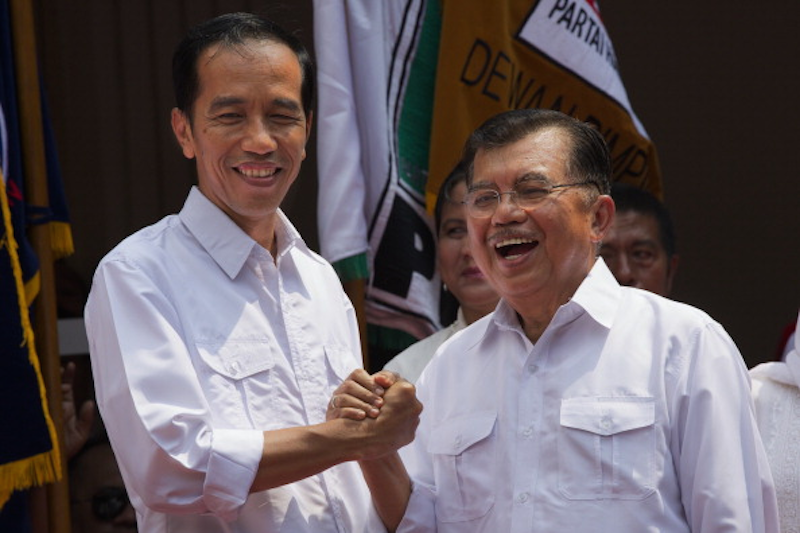
The Indonesian Presidential election on 9 July 2014 will be a tight, two-horse race, with frontrunner Joko ‘Jokowi’ Widodo’s only challenger, ex-general Prabowo Subianto, gaining the surprise support of a formidable coalition.
Jokowi’s Indonesian Democratic Party of Struggle (PDI-P) yesterday announced that former Vice President Jusuf Kalla will share the ticket as Vice Presidential Candidate. Kalla was formerly a chairman of the Golkar party, the country’s second largest, and many pundits were tipping Golkar would support Jokowi.
But one day before the deadline for Presidential candidates to register their candidacies in the National Election Commission, Jokowi’s main rival, the Gerindra Party’s Prabowo, unveiled his own alliance with Golkar. His running mate is a former Coordinating Minister for Economics and the chairman of PAN (a moderate Islamic party), Hatta Rajasa. Golkar’s support for Prabowo came after the party's chairman, business tycoon Aburizal Bakrie, failed to reach a political deal with the PDI-P.
The Jokowi-Kalla ticket is supported by a coalition of PDI-P, Nasdem (the National Democratic Party), PKB (the National Awakening Party) and Hanura (the People’s Conscience Party), capturing 34.69 per cent of the vote in the April parliamentary election. They declared their candidacies at the historic site of Gedung Juang 1945, promising a better future under the slogan: Indonesia Hebat (Great Indonesia). “We will bring change for people,” said Jokowi in the declaration.
His decision to pick Jusuf Kalla, an experienced senior politician and a respected figure as his running mate, is seen as a strategic answer to concerns about his own limitations.
In a showdown between Jokowi-Kalla and Prabowo-Hatta, major surveys were suggesting the Jokowi ticket could gain up to 51 per cent of the vote, and Prabowo- Hatta 32.4 per cent of votes.
But with Golkar’s support, Prabowo’s ticket has now secured a substantially larger coalition, with an accumulated vote of 59.2 per cent based on the parliamentary election result.
JOKOWI-KALLA
Since last year Jokowi, 53, has been leading in all major political surveys and polls as the favoured presidential candidate, forcing the party chairperson, Megawati Sukarnoputri, to announce in early March – with the April parliamentary election looming just around the corner - that Jokowi would be the candidate. The grassroots momentum of the so-called ‘Jokowi Effect’ helped the party to finish first in the parliamentary election, with 18.95 per cent of vote.
Jokowi is a new phenomenon in Indonesian politics. With his down-to-earth leadership style, he has attracted public and media interest in the past ten years first as the charismatic mayor of Surakarta, Central Java. His success in that post, (2005-2012), protecting small traders and traditional markets and introducing a moratorium on shopping mall developments, brought him to the next challenge: running for the governor of Jakarta.
As a capital city with some 13 million inhabitants, Jakarta endures the full gamut of urban problems - poverty, unemployment, traffic jams, insufficient housing, poor public facilities and fractured, overburdened infrastructure. Jokowi and his running mate, Basuki Tjahaja Purnama (another inspirational young leader, former head district of Belitung Timur) won the Jakarta election in 2012, supported mainly by Jakarta’s middle class. His commitment and dedication to fixing the city encouraged public hopes that he might also be capable of fixing the country.
Of course he has his critics, many questioning on whether he has the leadership and administrative skills required by a president. To govern in Jakarta is, they argue, a very different prospect to leading a country with a population of 237 million. They highlight his lack of international networks and experience with foreign diplomacy.
His decision to pick Jusuf Kalla, an experienced senior politician and a respected figure as his running mate, is seen as a strategic answer to many of those concerns.
Kalla is a seasoned politician since the New Order era. He entered national politics by joining Abdurrahman Wahid’s cabinet as the Minister of Trade and Industry (1999-2000) and Megawati’s cabinet as the Coordinating Minister for People Welfare (2001-2004) and as the Vice President in Yudhoyono’s cabinet (2004-2009). He was also the chairperson of Golkar Party (2004-2009).
In the 2009 election Kalla ran for the presidency, pairing with the former general Wiranto. After losing the battle, he took the helm of the Indonesian Red Cross and dedicated himself to humanitarian, peace and conflict resolution in many countries.
During his time as Vice President Kalla was often referred to as “the real president”, as he tended to act quickly and effectively, in contrast with President Yudhoyono, whose inclination was always to “play safe and act cautiously”. Kalla, known for his modest life style, has become a media darling, readily available to journalists and the wider public.
With four parties in their coalition, Jokowi-Kalla believe that they can win the election. Voters, especially the educated, urbanmiddle class are investing their hopes in Jokowi bringing new vision and energy to the national leadership.
The main concern expressed by observers after the declaration of Jokowi-Kalla, was that at 72 years of age, Kalla should take a more background role if they achieve office.
PRABOWO-HATTA
Prabowo Subianto is a controversial and colossal figure in Indonesian politics.
His background as the former Special Forces Commander in the New Order made him a target of constant criticism on human rights abuses, kidnappings and violence during the Suharto regime.
With his running mate Hatta Rajasa of PAN (or Partai Amanat Rakyat, the National Mandate Party) he has the endorsement of Gerindra, Golkar and two other Islamic parties: PPP (United Development Party) and PKS (Prosperous Justice Party). The coalition dubbed themselves “the big tent” to reflect their strong voter powerbase.
Prabowo has built his political career in the last 14 years. After the collapse of the New Order he decided to focus on his business, mainly overseas, while rebuilding his social network.
In 2008 he entered national politics, declaring his new party, Gerindra. He was picked as the Vice Presidential candidate by Megawati Soekarnoputri in 2009, however they lost the battle to the Yudhoyono-Boediono ticket.
His image as a former military general is reflected in his firm bearing and his penchant for safari suits and military-style outfits. But in stark contrast with his physical appearance and authoritarian style, Gerindra’s political manifesto promotes progressive pro-people programs to protect farmers, fishermen and small traders, including a pledge to form a Farmers’ Bank.
His choice for a running mate, Hatta Rajasa, is a moderate Islamic leader and a seasoned politician with experience in cabinets since 2001. Hatta was serving as Coordinating Minister for Economics until he resigned two days ago to make his run for office, and has also served as the State Secretary, Minister for Transportation and Minister for Research and Technology.
Prabowo’s decision to pick Hatta is seen as a strategy to attract Islamic voters, especially from the second largest Islamic organization, Muhammadiyah, which is affiliated with Hatta’s party.
This is for the first time the presidential election in Indonesia has had only two pairs of candidates or a head-to-head race. The newly democratic country conducted its first direct presidential poll in 2004, with six pairs of candidates contesting. In 2009, the presidential election was held with three pairs of candidates.
According to a political analyst from the Indonesian Science Institute, Siti Zuhro, the presidential election is more about figureheads and individual personas, regardless of the coalitions brokered by political elites. She believes that voters will make their choice based on character rather that policy platforms or programs.

